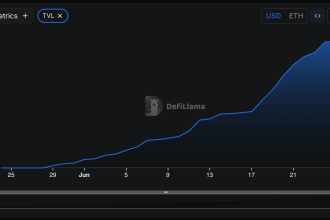Okay, here is the article rewritten in a professional news style, using HTML formatting.
US Securities and Exchange Commission (SEC) Commissioner Hester Peirce has advocated for protecting private crypto transactions, aligning with ongoing legal scrutiny of privacy technologies like Tornado Cash, in remarks delivered Monday at the Science of Blockchain Conference.
“We should take concrete steps to protect people’s ability not only to communicate privately, but to transfer value privately, as they could have done with physical coins in the days in which the Fourth Amendment was crafted.”
Tornado Cash Verdict Imminent
Commissioner Peirce made her comments as jury deliberations continue in the high-profile Tornado Cash trial.
Safeguarding Permissionless Technology
Speaking at the Science of Blockchain Conference, Peirce emphasized the need to safeguard privacy-protecting technologies and uphold user rights, including the right to self-custody cryptocurrency.
“Although a centralized intermediary or even a DAO deploying a DeFi application could build in restrictions on its use, an immutable, open-source protocol is available for anyone’s use in perpetuity, so requiring that it comply with financial surveillance measures is fruitless.”
Her key message contrasted regulated intermediaries with the characteristics of open-source permissionless protocols, arguing against imposing surveillance requirements on technologies that cannot practically comply.
Historical Context: Strong Crypto
Commenting on the debate surrounding technological control, Peirce drew a historical parallel to the 1990s conflict where governments sought to limit access to strong, private cryptography for national security concerns.
“The internet could not have succeeded without strong cryptography, so a determined set of cryptographers pushed back and convinced the government that cryptography in private hands was a net positive.”
Peirce noted that strong cryptography was essential for the internet’s success, and highlighted the role of developers like Phil Zimmermann (creator of PGP) in challenging government restrictions, ultimately convincing regulators that private cryptographic tools benefited society.
Opposition to DeFi Broker Rule
In the same address, Peirce voiced opposition to the now-defunct DeFi broker rule.
Related: CFTC starts ‘crypto sprint’ with SEC following White House plans
“Doing so would deputize us to surveil our neighbors—a practice antithetical to a free society. Nor should we require an intermediary to step in the middle of peer-to-peer transactions.”
Peirce argued that financial surveillance measures should not be imposed on peer-to-peer transactions. She repeated the argument that regulating technologies like DeFi protocols serves little practical purpose, citing the irreverability of open-source code and drawing an analogy to the early development of the internet.
“As with the internet, technologies that have legitimate uses are better left in the permissionless, available-for-all-to-use category, even though doing so enables people to use them for bad purposes, because taking any other course would impinge fundamental liberties.”
Though President Trump effectively blocked the so-called Decentralized Finance (DeFi) Broker Rule earlier this year (originating in the Biden administration), its intended scope required DeFi platforms to report detailed transaction information to the Internal Revenue Service (IRS).
Crypto Mixer Trial Underway
The heart of the SEC Commissioner’s focus is currently the trial of Roman Storm, co-founder of Tornado Cash.
Magazine: Robinhood’s tokenized stocks have stirred up a legal hornet’s nest
Storm faces charges that Tornado Cash was used for money laundering by criminal elements. Peirce’s position supports the argument made by Storm’s defense team and industry advocates—that Tornado Cash, as a tool often categorized as a decentralized wallet featuring privacy features, is similar to other financial software, usable by both legitimate and illicit actors. Thus, developers should not necessarily face liability for how users employ their tools.
Interestingly, the co-founders of another privacy-focused wallet, Samourai Wallet, are also navigating similar legal challenges stemming from their crypto mixing protocol, having initially pleaded not guilty before ultimately pleading guilty in July.











